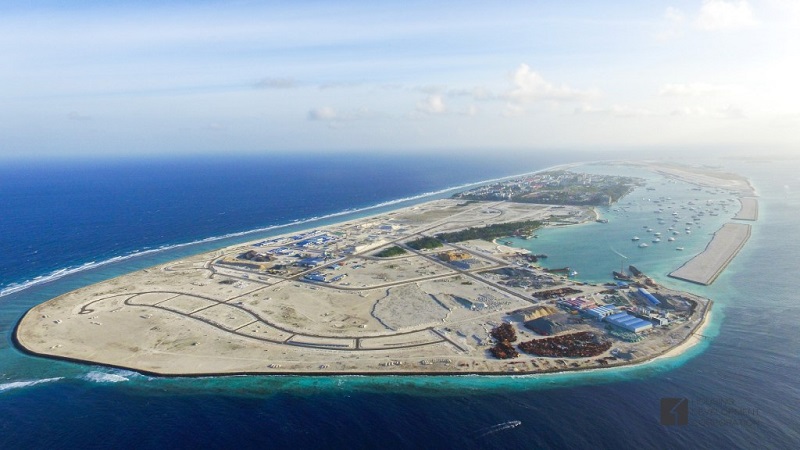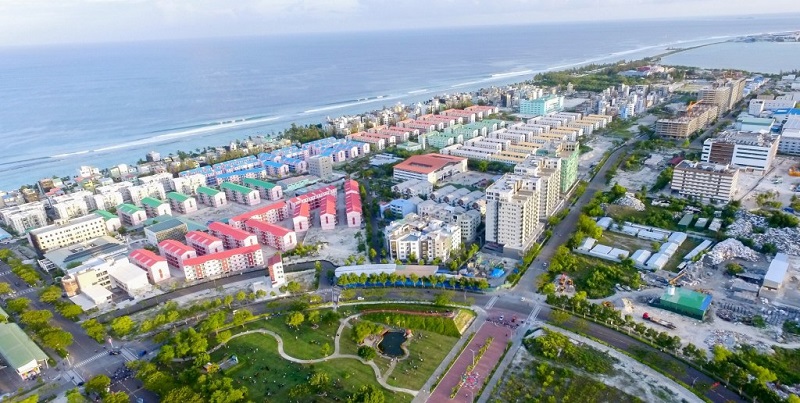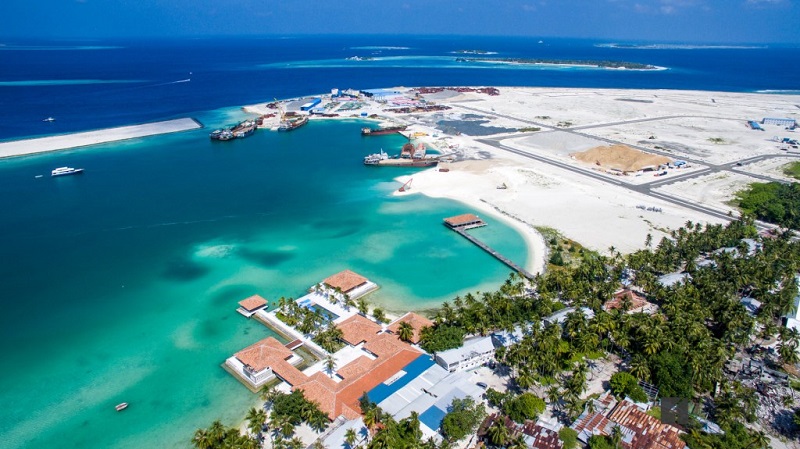Hulhumale - the city of hope
In February 2018, HDC (the Housing Development Corporation of the Maldives, the state-owned master developer of the new island city of Hulhumale) contacted the BRE regarding our potential involvement in assessing future developments there. A small delegation from BREEAM have returned from talks regarding further co-operation with HDC on this ambitious project.
Known mainly as a luxurious holiday destination for its white sands and turquoise waters, the Maldives is an island nation with thousands of years of history. An ancient trading hub between the Middle East, Asia and Africa, it’s culture and language are a blend of the civilisations that have landed on its shores. Beneath the seas, it also boasts one of the most diverse marine ecosystems in the world.
It is also a nation threatened by climate change. Over 80% of the country lies less than a metre above sea level – making it one of the most vulnerable countries in the world to rising sea levels [i], and rising sea temperatures continue to threaten its coral reefs and the rich ecosystems that depend on them.[ii]
Tourism forms the backbone of the economy, but the needs of luxury resorts and their guests puts pressure on a country with very few natural resources and one already dependent on imports. Although resort operators are mandated to provide their own power, sewage treatment and desalination, in a country known for its abundant sun, much of the country is still powered by industrial-scale diesel generators.[iii]
To address some of these issues in 1997 the government began the reclamation of a lagoon adjacent to Male. Deep sea dredgers poured millions of tons of sand onto the volcanic bed rock that would eventually form Hulhumale. Placed 2 m above sea level, it is designed to withstand the threat of rising sea levels.
Unlike the capital Male, where more than 150,000 people are squeezed onto an island less than one square mile, there are green spaces, public parks and room to breathe for the residents here.
Construction of Phase 1 is now nearly complete and will eventually become a community of 80,000 living in a master-planned city. Retail, education, community and leisure facilities are already creating a thriving society. Work on Phase 2 continues apace – with reclamation completed in only 77 days [iv], the first high density housing is now being constructed and this phase is set to become a focus for government, tourism and commerce.
Once complete, the City of Hope will accommodate 240,000 people, easing the significant population pressure in Male, giving two thirds of the country’s population access to new opportunities… and perhaps a sanctuary from the worst effects of climate change.
However, balancing the needs of economy, society and sustainability has not been easy:
- Planning and zoning regulations are regularly challenged by developers (accustomed to building right to the boundary of parcels of land), keen to maximise their financial gain.
- Holistic awareness of sustainability within the construction industry remains limited, and the focus remains on minimising capital cost.
- Establishing BREEAM where few standards exist for the minimum performance of buildings sets a high bar for new developments.
BRE's conversation with HDC continues. A follow-up tele-conference between HDC and the Strategic Advisory, BREEAM Communities and BREEAM International teams point towards the possibility for several potential solutions that together could address many of the challenges facing the sustainable development of Hulhumale:
- Discussions are taking place regarding the potential assessment of Phase 2 of Hulhumale under BREEAM Communities.
- The BREEAM International team will be providing support for the assessment of HDC’s first non-domestic BREEAM developments.
- The Strategic Advisory team, who have previously worked with the Brazilian government for the development of a social housing sustainability toolkit may have the opportunity to develop a tailor-made solution for social housing in the Maldivian context.
It is too early to tell what impact will be made, but BRE's hope is that one day the Maldives will gain international recognition not only for its natural beauty, but also for its sustainable built environment.
For more information on Hulhumale, visit hdc.com.mv/hulhumale/
References:
- [i] https://www.climatehotmap.org/global-warming-locations/republic-of-maldives.html
- [ii] https://www.theguardian.com/environment/2016/jun/01/coral-bleaching-spreads-to-maldives-devastating-spectacular-reefs
- [iii] http://www.environment.gov.mv/v2/en/news/6790
- [iv] https://hdc.com.mv/hulhumale/
This article was originally published here by BRE Buzz on 20 Sept 2018. It was written by Weikai Gong.
--BRE Buzz
[edit] Related articles on Designing Buildings Wiki
Featured articles and news
A case study and a warning to would-be developers
Creating four dwellings for people to come home to... after half a century of doing this job, why, oh why, is it so difficult?
Reform of the fire engineering profession
Fire Engineers Advisory Panel: Authoritative Statement, reactions and next steps.
Restoration and renewal of the Palace of Westminster
A complex project of cultural significance from full decant to EMI, opportunities and a potential a way forward.
Apprenticeships and the responsibility we share
Perspectives from the CIOB President as National Apprentice Week comes to a close.
The first line of defence against rain, wind and snow.
Building Safety recap January, 2026
What we missed at the end of last year, and at the start of this...
National Apprenticeship Week 2026, 9-15 Feb
Shining a light on the positive impacts for businesses, their apprentices and the wider economy alike.
Applications and benefits of acoustic flooring
From commercial to retail.
From solid to sprung and ribbed to raised.
Strengthening industry collaboration in Hong Kong
Hong Kong Institute of Construction and The Chartered Institute of Building sign Memorandum of Understanding.
A detailed description from the experts at Cornish Lime.
IHBC planning for growth with corporate plan development
Grow with the Institute by volunteering and CP25 consultation.
Connecting ambition and action for designers and specifiers.
Electrical skills gap deepens as apprenticeship starts fall despite surging demand says ECA.
Built environment bodies deepen joint action on EDI
B.E.Inclusive initiative agree next phase of joint equity, diversity and inclusion (EDI) action plan.
Recognising culture as key to sustainable economic growth
Creative UK Provocation paper: Culture as Growth Infrastructure.
Futurebuild and UK Construction Week London Unite
Creating the UK’s Built Environment Super Event and over 25 other key partnerships.
Welsh and Scottish 2026 elections
Manifestos for the built environment for upcoming same May day elections.
Advancing BIM education with a competency framework
“We don’t need people who can just draw in 3D. We need people who can think in data.”




























